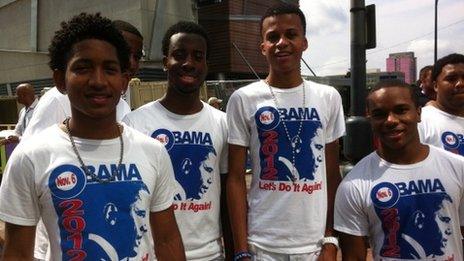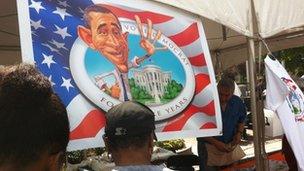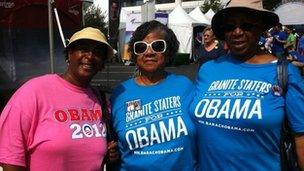Democratic convention: Charlotte crowds cool on Obama
- Published

The youth vote helped propell Obama to power but there is little of the excitement of 2008
"I am voting for Barack Obama!" shouts the diminutive whirlwind in a black suit and white shirt, RnB singer Janelle Monae.
The Charlotte crowd, mainly made up of Democratic supporters, roars its approval.
She then speaks the introduction to her most famous hit, external: "This is a cold war - do you know what you're fighting for?" It is a very good question.
There is a mystery at the heart of American politics - what exactly President Obama would do if he wins another term in office? So much so that the The Economist has put it on its front cover, external.
I have never covered an election when the incumbent has been so reluctant to spell out the details of his or her future plans.
Admittedly, sometimes they have been pretty paltry. I covered the UK election when John Major promised to set up a telephone hotline if you were annoyed about road-works, external, for example.
But usually too much detail, not too little, is the problem. Leaders tend to like telling people what they will do if they win. But so far Mr Obama has offered nothing new.
This convention is an opportunity to change that. But it is a tricky moment for him.
At the Carolinafest, external there is a cheerful mood. The music is excellent, the ribs look good and, amid the t-shirt and food stalls, there are earnest displays promoting sustainable low-cost housing and electric cars.
Every third person wears a badge or t-shirt featuring Mr Obama and nearly all are hoping he wins in November.
But there is nothing like the wild excitement of 2008 and many I speak to admit to being a bit disappointed with their president.
Mission impossible
The truth is he has disappointed left, right and centre. Perhaps the ubiquity of the sentiment demonstrates that he was never going to be able to please everyone.

There was enthusiasm but not joy at the pre-convention party
The left regret he has not closed Guantanamo, secured immigration reform or backed gay marriage more quickly.
Some on the right, like his Republican opponent Mitt Romney, say they wish he had succeeded for the sake of America, external.
Other conservatives say they had hoped he was a centrist rather than the extreme left-winger they see him as.
The centre laments that he has not ushered in a new era of co-operation.
Of course, the economy stands behind all of this. Without the fragility of the recovery and high unemployment this would be all so much chaff among political obsessives, not a solid national mood.
But the economy is not all. There was a widespread feeling in 2008 that Mr Obama really was different, that he would transform politics from something grubby to something glorious. But Arthur pulled the sword from the stone, yet monsters still roam Camelot.
People watched the alchemist hoping base metal would turn to gold but he is left poking around in his crucible pointing out that some of the stuff looks a bit more shiny.
I do not want to overdo this. I regularly meet voters who think he has done as well as he could, and that the criticism is mean, and partisan, from people who would have done much worse.
Nevertheless, while people do not know what they wanted him to do exactly, a lot of them do feel he has squandered an opportunity, external and was just too ordinary.
More of the same
So he is going to a country to appeal for a second term when many are distinctly unimpressed with his first. All of which makes this a very awkward convention for Mr Obama and the Democrats.
His campaign, so far, boils down to two arguments. The first is: "It could have been worse."
Without the bailout for the car industry and the banks, without the stimulus package, the economy would not be growing slowly, it would have crashed.

Many Democrats admit to being a bit disappointed with their president
The rights and wrongs of the central argument have been debated across European and American politics for the last five years, so I am not going to revisit them here.
But, even if he is right, he is asking saintly patience of a people brought up to be intolerant of the long view.
Maybe you cannot just stick an economy in a microwave and re-heat it, but many Americans feel someone should invent something that can.
The second half of the Obama campaign strategy projects this point into the future: "If you think I'm bad the other guy would be far worse."
The argument goes that Mr Romney would take the economy back to former President George W Bush's policies (always labelled as "failed") and life in America back to the 1950s - a war against women and gays.
He would give tax breaks to millionaires at the expense of the middle classes, the argument continues. Mr Obama says the Republican convention looked like it should have been on black and white TV.
So, "hope and change" have been replaced by "fear, and more of the same". It is not inspiring, but it may work.